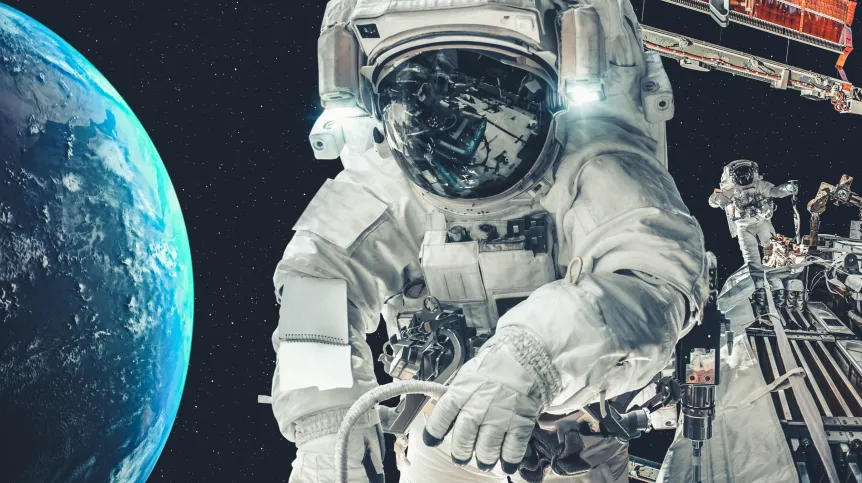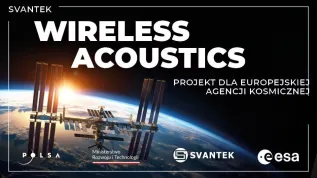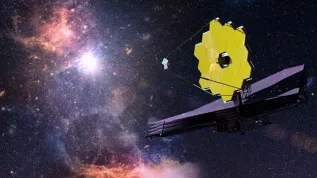
Investigating the impact of space isolation on human mental well-being is the aim of the 'AstroMentalHealth' experiment - one of thirteen to be conducted as part of the Polish technological and scientific mission IGNIS on the International Space Station (ISS).
The results of the experiment may contribute to the development of better psychological support systems for space crews.
The IGNIS mission experiments will be conducted on the ISS by Polish astronaut Sławosz Uznański-Wiśniewski, who is a member of the four-person crew of the Axiom 4 (Ax-4) mission.
The starting point for the 'AstroMentalHealth' research topic is the issue of mental overload of people in isolation, which is the subject of the research work of the originator and coordinator of the experiment, Agnieszka Skorupa, PhD, from the University of Silesia in Katowice.
'Our experiment will primarily explore the mental well-being of people who are isolated - in this case, in one of the most extreme isolations, that is, in space. We are social beings, and our bodies are designed to move, so cutting us off from the social context and locking us in a relatively small space is an adaptive challenge. Add to this the risk associated with physiological adaptation, and we are already dealing with extreme isolation', the scientist says in an interview with PAP.
She adds that astronauts are people in excellent health condition and with excellent cognitive and physical parameters. 'In our project, we are checking how these amazing and highly specialized people adapt to such unfavourable conditions as the International Space Station; how they cope and what they experience during the mission', Skorupa says.
To this end, the researchers will take measurements before, during and after the mission. The first interviews with astronauts have already taken place.
'At first, we check certain traits that we know from the literature and that are known to contribute to mental overload - or, on the contrary, minimize the risk of its occurrence. For example, mindfulness, i.e. attentiveness, the ability to be here and now, to focus on experiencing a given moment. A lot of research confirms that this trait helps maintain a person's mental well-being even in unfavourable conditions', the psychologist points out.
An example from the other extreme - an undesirable trait - is neuroticism, i.e. anxiety, low resistance to stress.
'Before the mission, we monitor these traits. Then, during the mission, we will check how people with a given set of traits adapt to extreme, isolated conditions. And how this adaptation changes over time. We will check the fluctuation of emotions, the sense of stress, work efficiency and longing for the natural environment', she explains.
During the interview, scientists ask astronauts, for example, how they imagined the space mission at the beginning, when they found out about it, and how they see it now - a few weeks before launch, and how they will evaluate it during and after returning from the ISS.
'This is just one example. The idea is that perception strongly shapes our emotional attitude and whether we experience disappointment, or whether we feel prepared to experience certain situations', the expert explains.
She adds that IGNIS is a short-term mission, it will last two weeks. 'Short-term missions are much less burdensome for astronauts, but they show in a nutshell what is worth knowing in the context of adaptation to isolation conditions, thinking about long missions, e.g. a flight to Mars', she says.
Data will be collected in three ways. The first method involves questionnaires (before, during and after the mission). The second consists of interviews with astronauts before and after the mission, and analysis of video recordings that the astronauts will make during the mission. This will be complemented by analysis of the expression of emotions observed on the astronauts' faces during video diaries on the ISS.
'So we have verbal declarations, questionnaire declarations and hard physiological measurement. We will check how they correspond to each other', the scientist says.
The collected data will be subject to both qualitative and quantitative analysis. 'We are aware of the limitations of psychological methods, which is why we reach for standardized research questionnaires and analyse the content of statements based on research methods established over the years', the psychologist emphasises.
In parallel with the mission in space, the researchers will also conduct a mirror mission in analogue conditions in the LunAres Habitat in Piła. Five people, counterparts of the crew of astronauts on the ISS, will be subjected to three weeks of isolation, and after a few days the crew will be joined - for a period of two weeks - by four new people, who are counterparts of the Ax-4 mission. The psychologist adds that the composition of the group reflecting Axiom will reflect the age, gender and professional structure of real astronauts.
'This is probably the first such undertaking in the world, where the same research procedures will be carried out both in space and on Earth. The mirror mission will take place at the same time as the Ax-4 flight, but with a delay of several days, so that we know what is happening on the station and can reflect the given conditions', she says.
The researchers' goal is to look for certain patterns, e.g. in the context of work efficiency or technostress (the ISS environment is completely dependent on technology). 'If our assumptions are confirmed, then in the future we will be able to propose specific indicators of the mental well-being of astronauts, which should be taken into account in psychological monitoring', the researcher says.
According to Skorupa, strictly psychological research on astronauts is not common. 'In the space sector, a lot of research concerns so-called human studies, which focus on research in the field of medicine, including psychiatry. It seems to us that monitoring intrapsychic experiences would also be of great value. On the other hand, we really have a lot of psychological research based on the results of analogue missions. It is time to combine them', she says.
'+AstroMentalHealth+ is a huge adventure for me and an opportunity for scientific development and gaining unique experience. It is also proof that psychology and the human psyche are important, and that it is worth taking care of this aspect of human functioning', the researcher concludes.
The Axiom 4 mission is to launch no earlier than May this year.
Agnieszka Kliks-Pudlik (PAP)
PAP - Science in Poland
akp/ agt/ jpn/













